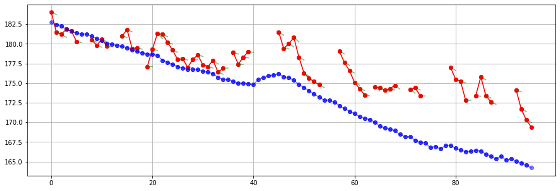What is the reason why the diet that accurately calculated 'consumption of 500 kcal per day' for more than one year did not go as expected?

A diet is not effective overnight, and it is recommended that you have a well-balanced diet, moderate exercise, and lose weight gradually over a long period of time. While there are many people who do not continue on a diet, the man who calculated his own intake energy and consumed energy and made a diet with the goal of 'consuming 500 kcal a day' has released a record of the diet for one year.
Biohacking Lite
As of June 2019, Andrey Carpathy weighs about 200 pounds (about 90 kilograms). Carpathy started her diet with the goal of losing weight to 175 pounds (about 79 kilograms) by examining her weight for her gender, age and height.
The weight of a human can be said to be the sum of the weights of the atoms that make up the human body, such as carbon, hydrogen, nitrogen, and oxygen. Body weight can also change significantly depending on the content of sodium, glycogen, hormones, vitamins and minerals, stomach and intestinal contents, stool and urea. Studies have shown that when fat is burned, the carbon and hydrogen atoms that make up fat are vaporized and released from the body by being released from the breath. The breath looks transparent, but it breathes in a lot of oxygen and exhales a lot of carbon dioxide. The carbon contained in the exhaled carbon dioxide may have been a part of fat, triacylglycerol , just a few seconds ago.
Humans also have a very simple energy system. The only way humans can get energy is by digesting and absorbing food. Food refers to organic molecules that humans can digest to produce energy. The amount of energy that humans can obtain can be estimated from the number of calories in food, but since there are indigestible foods such as dietary fiber, it is difficult to know the exact energy obtained from food by simple calorie measurement, Mr. Carpathy says I pointed out.

It seems that most of the energy consumption is exercise, but in reality, a large proportion is basal metabolism to maintain the vital activity of the human body. In order to keep alive, humans must continuously manage body temperature regulation, respiration, heartbeat, brain, nerve function, blood circulation, etc. The energy consumed for that is the basal metabolic rate. Carpathy said, 'Compared to basal metabolism, the sperm's tears are the energy consumed by 30 minutes of exercise in a gym. It's great to have aerobic habits, but if aerobic exercise itself loses weight If you think you're making a big difference, that's a mistake.'
In order to lose weight, it is a dogma to eat less and increase the amount of movement. This means that you can lose weight by reducing your energy intake and consuming more energy. At the beginning of his diet, Carpathy sought to lose about one pound (about 454 grams) per week to avoid undue stress and dizziness.
About £1 a week is a recommended guide in

Carpathy, who determined that it was difficult to consume about 500 kcal a day with calorie restriction alone, continued his diet while restricting his diet and incorporating aerobic exercise. In order to control appetite and reduce snacking, Mr. Carpathy also performs a '16:8 diet' at the same time, fasting for 16 hours a day and eating whatever he likes for the remaining 8 hours.
In addition, Carpathy banned the intake of sugars other than berries, processed foods, soda, orange juice, alcohol, and milk during the diet. For regular aerobic exercise, he used to cycle several times a week and did strength training.
In the graph below, the vertical axis represents weight (lbs) and the horizontal axis represents days. The green points are Mr. Carpathy's weight, and the green lines are the changes in weight. Carpathy began her diet in June 2019 at about 195 pounds (88 kilograms) with a blue vertical line. The first 120 days was a period where we weighed in order to compare the effects of diet, and Mr. Carpathy ate as he likes until he is full. A year after starting the diet, Mr. Carpathy lost 165 pounds (about 74 kilograms) and lost 0.58 pounds (0.26 kilograms) per week throughout.

Weight loss of £0.58 per week has fallen short of the original “pound per week” goal. During the diet, Mr. Carpathy spent 100 days starting in the second half of 2019 on investigating the cause of weight loss that was less than expected, and scrutinized his energy increase and decrease.
Regarding energy intake, it was said that Mr. Carpathy confirmed the nutritional component labeling of all foods he ate and recorded it in a notebook application, and estimated the intake amount of foods without nutritional component labeling and recorded it. For energy consumption, we recorded the values obtained from the Apple Watch 'Activity App', calculated the expected weight loss from daily energy gains and losses, and finally compared it to the actual weight loss.
In the graph below, the vertical axis represents weight (lbs) and the horizontal axis represents days. The weight calculated by Mr. Carpathy is drawn in blue, and the actual weight is drawn in red, which shows that there was a big difference between Mr. Carpathy's calculation and the actual weight.

Mr. Carpathy said there were various reasons such as 'I underestimated the calories I ate' 'I overestimated the calories burned by Apple Watch' 'The conversion of 1 pound of fat = 3500 kcal was off' It is possible that there is a possibility.
Carpathy also said he was gaining weight more than he expected with the intake of carbohydrates such as bread, pasta and potatoes. Carpathy speculates that the carbohydrates eaten may have gained weight by absorbing water like a sponge and gaining weight, or increasing glycogen in the body. Carbohydrates helped me gain weight, but he said, 'If you try to eat a low-carb diet, you'll regain weight in a few days,' Carpathy said.
As a result, he lost his weight and succeeded in improving his heart rate, blood sugar level, physical strength and endurance in addition to his weight. Mr. Calpathy said, 'I can say that my physical condition has improved significantly, and my body line has become sharper, but to be honest, it feels the same as before dieting. However, looking at the numbers, I am heading in a good direction. I'm happy because it seems to be there.'
Related Posts:
in Posted by darkhorse_log







